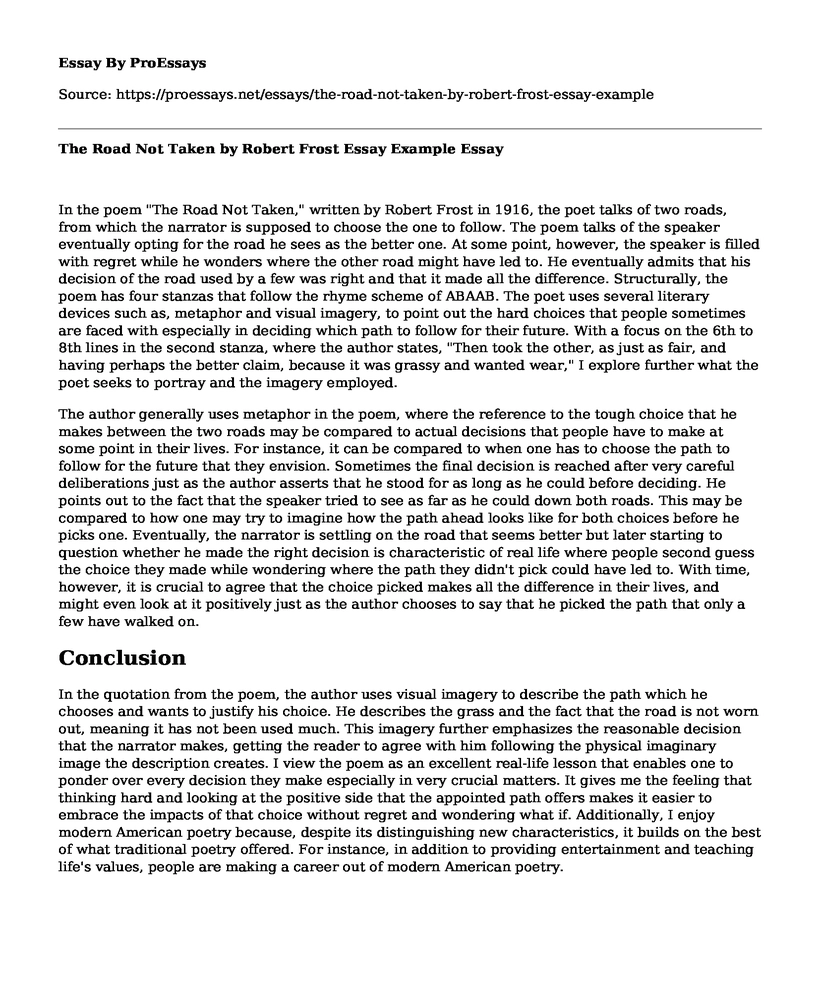In the poem "The Road Not Taken," written by Robert Frost in 1916, the poet talks of two roads, from which the narrator is supposed to choose the one to follow. The poem talks of the speaker eventually opting for the road he sees as the better one. At some point, however, the speaker is filled with regret while he wonders where the other road might have led to. He eventually admits that his decision of the road used by a few was right and that it made all the difference. Structurally, the poem has four stanzas that follow the rhyme scheme of ABAAB. The poet uses several literary devices such as, metaphor and visual imagery, to point out the hard choices that people sometimes are faced with especially in deciding which path to follow for their future. With a focus on the 6th to 8th lines in the second stanza, where the author states, "Then took the other, as just as fair, and having perhaps the better claim, because it was grassy and wanted wear," I explore further what the poet seeks to portray and the imagery employed.
The author generally uses metaphor in the poem, where the reference to the tough choice that he makes between the two roads may be compared to actual decisions that people have to make at some point in their lives. For instance, it can be compared to when one has to choose the path to follow for the future that they envision. Sometimes the final decision is reached after very careful deliberations just as the author asserts that he stood for as long as he could before deciding. He points out to the fact that the speaker tried to see as far as he could down both roads. This may be compared to how one may try to imagine how the path ahead looks like for both choices before he picks one. Eventually, the narrator is settling on the road that seems better but later starting to question whether he made the right decision is characteristic of real life where people second guess the choice they made while wondering where the path they didn't pick could have led to. With time, however, it is crucial to agree that the choice picked makes all the difference in their lives, and might even look at it positively just as the author chooses to say that he picked the path that only a few have walked on.
Conclusion
In the quotation from the poem, the author uses visual imagery to describe the path which he chooses and wants to justify his choice. He describes the grass and the fact that the road is not worn out, meaning it has not been used much. This imagery further emphasizes the reasonable decision that the narrator makes, getting the reader to agree with him following the physical imaginary image the description creates. I view the poem as an excellent real-life lesson that enables one to ponder over every decision they make especially in very crucial matters. It gives me the feeling that thinking hard and looking at the positive side that the appointed path offers makes it easier to embrace the impacts of that choice without regret and wondering what if. Additionally, I enjoy modern American poetry because, despite its distinguishing new characteristics, it builds on the best of what traditional poetry offered. For instance, in addition to providing entertainment and teaching life's values, people are making a career out of modern American poetry.
Cite this page
The Road Not Taken by Robert Frost Essay Example. (2022, Aug 18). Retrieved from https://proessays.net/essays/the-road-not-taken-by-robert-frost-essay-example
If you are the original author of this essay and no longer wish to have it published on the ProEssays website, please click below to request its removal:
- Characters of Antigone in "Antigone" and Nora in "A Doll's House" Essay
- The Character Analysis for the Main Character Walter Lee Younger
- Suffering Breeds in Wisdom: King Lear Essay
- Essay on Frankenstein Experiment: Challenge on Ethics and Morality
- Poetry Analysis Essay on Invictus: Triumph Over Adversity
- Essay Example on Howard Hughes: Success Despite OCD
- Essay Example on Raskolnikov's Alienation from Society in Dostoyevsky's Crime and Punishment







